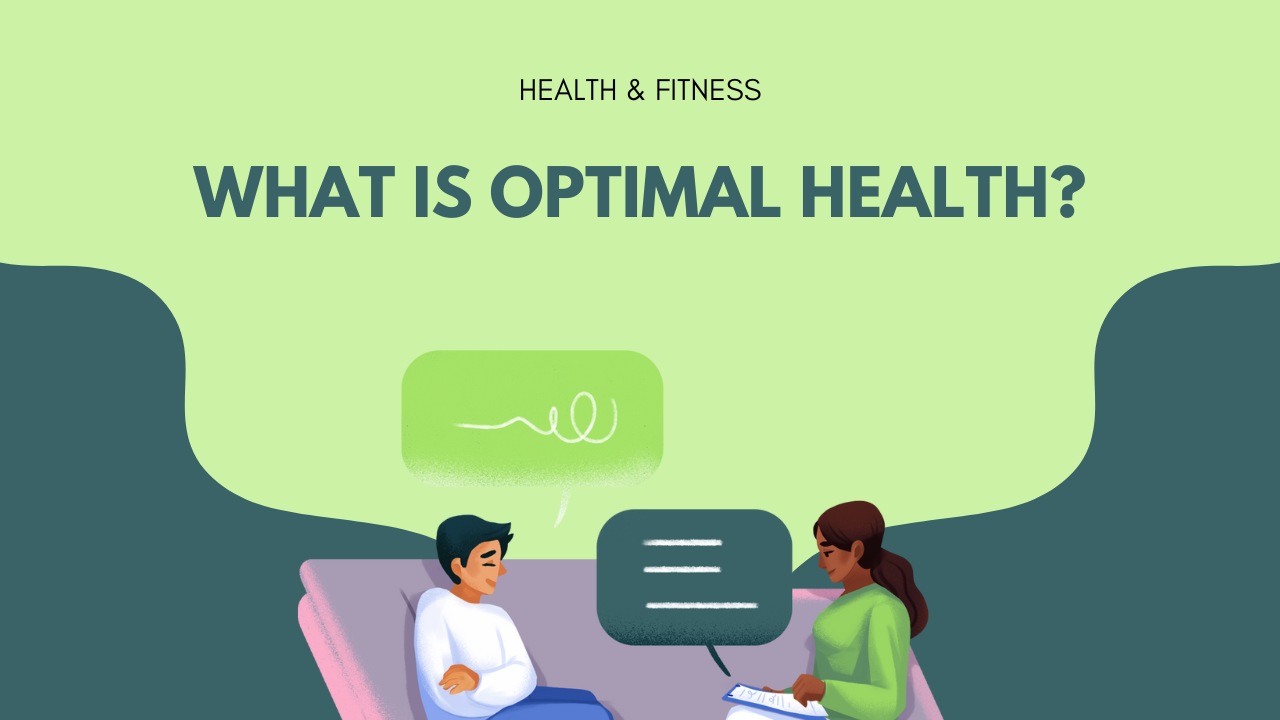What is optimal health
Definition of optimal health
Optimal health refers to a state of well-being where a person achieves the highest level of physical, mental, and social functioning. It goes beyond the absence of disease and emphasizes the active pursuit of activities, choices, and lifestyles that lead to a full, vibrant life. Optimal health is dynamic and holistic, taking into account not only the condition of the body but also the resilience of the mind and the quality of social relationships.
In short, it is about thriving rather than merely surviving. Optimal health involves a balance that allows individuals to meet the demands of their daily lives, meet challenges, and maintain a sense of overall vitality. It is a state that promotes longevity, productivity and a positive outlook on life.
Importance of Optimum Health
The importance of optimal health cannot be underestimated. It serves as the foundation of a full and meaningful life. When individuals prioritize their well-being, they experience increased energy levels, enhanced cognitive function, and a greater ability to manage stress. Best health is not merely the absence of disease; It is the active pursuit of practices that promote resilience and prevent health problems.

Additionally, optimal health contributes to reducing the risk of chronic conditions, boosts the immune system and supports longevity. It allows individuals to fully engage in their personal and professional lives, fostering a sense of purpose and accomplishment. By understanding and prioritizing optimal health, individuals can actively shape their lifestyle to promote a flourishing existence.
Brief overview of key components
Achieving optimal health involves a multidimensional approach that addresses various components of wellness. Nutrition plays an important role with a focus on a balanced diet rich in essential nutrients. Regular exercise is another key component, promoting heart health, strength and flexibility. Adequate sleep is essential for physical and mental health benefits.
Mental and emotional well-being are integral, with emphasis on stress management, mindfulness, and emotional resilience. Social well-being includes fostering meaningful relationships and building a support network. Environmental factors, such as healthy living environments and sustainable practices, contribute to the overall picture of optimal health.
In short, “what is optimal health” encompasses a comprehensive understanding of well-being, encompassing the physical, mental, and social dimensions needed to live a life of vitality and fulfillment.
Components of Optimal Health
Optimal health is a holistic concept that includes various dimensions, each of which plays an important role in achieving overall well-being. Understanding and nurturing these components is the key to unlocking the full potential of a healthy lifestyle.
A. Physical Well-Being
Nutrition
Optimal health starts with the fuel we give our bodies. A balanced and nutritious diet ensures that we get the vitamins, minerals and nutrients needed for bodily functions. By focusing on nutritious foods, individuals can lay a foundation for strong physical health.
Exercise
Regular physical activity is the cornerstone of optimal health. Exercise not only contributes to maintaining a healthy weight but also promotes heart health, strengthens muscles and bones and supports overall mobility. It is an important component in the pursuit of optimal well-being.
Sleep
Quality sleep is often underestimated but plays a vital role in optimal health. During sleep, the body undergoes important processes for repair and rejuvenation. Adequate and restful sleep is associated with better cognitive function, emotional well-being, and a stronger immune system.

B. Mental and emotional well-being
stress management
Chronic stress can have harmful effects on both mental and physical health. Implementing effective stress management techniques, such as mindfulness and relaxation exercises, is essential to achieving and maintaining optimal health.
Mental Health Practices
Mental health is as important as physical health. Incorporating practices like meditation, therapy, and self-reflection promote positive mental states, thereby enhancing overall well-being.
Emotional Flexibility
Developing emotional resilience enables a person to face life’s challenges more effectively. This includes coping with adversity, maintaining a positive attitude, and adapting to changes, significantly contributing to optimal health.
C. Social Welfare
Relationships and Relationships
Building and nurturing meaningful relationships is an important aspect of optimal health. Positive social relationships contribute to emotional support, reduce feelings of isolation, and increase overall life satisfaction.
community engagement
Actively participating in a community provides a sense of belonging and purpose. Whether through volunteering or engaging in group activities, community participation contributes to social well-being.
Support Systems
Having a reliable support system, including friends, family or community networks, is invaluable. These support systems provide emotional, practical, and sometimes financial support, creating a safety net for individuals seeking optimal health.
D. Environmental Factors
Healthy living environment
The environment we live in has a significant impact on our health. A clean, safe and organized living space promotes physical health and mental well-being. Creating a conducive environment at home and at work is an integral part of optimal health.
Sustainability
Optimal health extends beyond individual well-being to also include the health of the planet. Adopting sustainable practices, such as reducing waste and conserving resources, aligns with a holistic approach to optimal health that considers the interconnectedness of all living things.
In conclusion, achieving optimal health involves a multidimensional approach that addresses physical, mental, social, and environmental well-being. By recognizing and nurturing these components, individuals can begin a transformational journey toward a healthier and more fulfilling life.

FAQs about Optimal Health
A. What does optimal health mean?
Optimal health refers to a state of complete well-being where a person achieves peak physical, mental, and social fitness. It goes beyond the absence of disease and involves an overall balance in various aspects of life. Optimal health implies not only the absence of disease but also the presence of positive factors that contribute to a vibrant and fulfilling life. It involves making conscious choices that promote overall well-being and vitality.
B. How can I achieve optimal health?
Achieving optimal health involves taking a comprehensive approach that includes a variety of lifestyle choices. This includes maintaining a balanced diet rich in nutrients, engaging in regular physical activity, ensuring adequate sleep, and actively managing stress. Additionally, fostering positive relationships, staying socially connected, and nurturing mental well-being contribute significantly to achieving and maintaining optimal health.
C. Can optimal health be achieved for everyone?
While the definition of optimal health may vary for individuals, the pursuit of well-being applies universally. Optimal health is attainable for everyone, regardless of age, background or current health status. This includes personalized options and actions that are tailored to one’s specific needs and circumstances.
D. Can genetics influence optimal health?
Genetics may play a role in determining some aspects of health, but it does not solely determine the ability to achieve optimal health. Although some individuals may have genetic predispositions, lifestyle factors such as diet, exercise and other habits significantly influence overall well-being. Even in the presence of certain genetic factors, making healthy choices can have a positive impact on health outcomes.
E. How does stress affect optimal health?
Stress can have a profound impact on optimal health, affecting both mental and physical health. Chronic stress can contribute to a variety of health problems, including cardiovascular problems, weakened immune function and mental health challenges. It is important to effectively manage stress through relaxation techniques, mindfulness, and positive coping mechanisms to maintain optimal health.
F. Is optimal health only physical well-being?
No, optimal health goes beyond physical well-being. It includes mental, emotional and social dimensions. Achieving optimal health involves finding harmonious balance in all of these areas, recognizing the interconnectedness of physical and mental well-being, and nurturing positive social relationships. A holistic approach that addresses different aspects of health is the key to achieving and maintaining optimal wellness.
In short, understanding what optimal health means and taking a holistic approach that considers lifestyle choices, genetics, and stress management is fundamental to achieving and maintaining this state of complete well-being.
Tips for Maintaining Optimal Health
Maintaining optimal health is a holistic endeavor that involves developing positive habits in various aspects of our lives. Let’s look at essential tips for achieving and maintaining optimal health, each of which contributes to a person’s overall well-being.
A. Healthy Eating Habits
Achieving optimal health starts with fueling our bodies with nutritious foods. Optimal health includes a balanced diet rich in fruits, vegetables, lean proteins and whole grains. Prioritize nutrient-rich options that provide essential vitamins and minerals for overall well-being.
B. Regular Exercise Routine
Physical activity is the cornerstone of optimal health. Incorporating a regular exercise routine contributes to heart health, muscle strength and mental well-being. Whether it’s brisk walking, jogging, or engaging in a favorite sport, frequent physical activity is important for achieving and maintaining optimal health.
C. Prioritizing mental health
Optimal health is not just about the body; This includes mental and emotional well-being. Practices like mindfulness, meditation and stress management techniques play an important role. Prioritizing mental health ensures a harmonious balance between mind and body.

D. Building Strong Social Relationships
Human relationships are integral to optimal health. Developing strong social relationships provides emotional support, reduces stress, and contributes to a sense of belonging. Connecting with friends, family, and community creates a positive environment for overall health.
E. Creating a healthy living environment
The environment we live in has a significant impact on our health. A healthy living environment includes minimizing exposure to pollutants, ensuring proper ventilation, and incorporating elements that promote relaxation. It involves maintaining a clean and organized space conducive to both physical and mental well-being.
In short, optimal health is a multidimensional concept that includes not only the absence of disease but also the development of positive habits in various life areas. By adopting healthy eating, regular exercise, mental well-being, social connections, and a supportive living environment, individuals can pave the way to a life of vitality and overall optimal health.
Challenges in Achieving Optimal Health
Achieving optimal health is a holistic journey that involves dealing with various challenges, both external and internal. Understanding and addressing these challenges is important for individuals attempting to achieve a state of well-being that encompasses physical, mental, and social dimensions.
A. external factor
Optimal health can be disrupted by external factors beyond a person’s immediate control. Environmental pollution, limited access to health care, and socio-economic disparities can affect one’s ability to maintain a healthy lifestyle. In these cases, achieving optimal health may require systemic change, community initiatives, and advocacy for policies that promote health equity. It emphasizes the interconnectedness between individual well-being and broader social factors.
B. Personal Barriers
Personal barriers, such as unhealthy habits, lack of motivation, or lack of time, can hinder progress toward optimal health. Overcoming these obstacles involves self-reflection, goal-setting, and developing positive habits. It is important for individuals to recognize and address personal limitations, seeking assistance from health care professionals, friends, or family when needed. Education and awareness play a vital role in empowering individuals to make informed choices for their well-being.
C. Overcoming Obstacles
Overcoming obstacles to optimal health requires resilience and a proactive mindset. Setting realistic goals, building a support network, and adopting a growth mindset are key strategies. Individuals should view challenges not as obstacles but as opportunities for growth and improvement. Learning from failures, adjusting strategies, and remaining committed to the pursuit of best health contribute to long-term success.
In short, accepting and addressing external factors, personal barriers, and obstacles are integral aspects of the journey toward optimal health. By recognizing these challenges and taking a proactive approach, individuals can tackle the complexities of their well-being and work toward achieving optimal health status.
Conclusion
Ultimately, it is important to understand “what is optimal health” to achieve an overall sense of well-being. Optimal health includes not only physical fitness but also mental, emotional and social well-being. It is a state where individuals try to balance different aspects of their lives to achieve a harmonious and fulfilling existence.
Reiterating the key components, optimal health includes maintaining a nutritious diet, engaging in regular physical activity, ensuring adequate sleep, managing stress, promoting positive mental and emotional states, and developing strong social relationships. By paying attention to these aspects, individuals can build the foundation for a healthier and more resilient life.
It is important for those embarking on a journey to optimal health to approach it with a sense of encouragement and inspiration. Recognize that there may be challenges along the way, and that setbacks are a natural part of the process. Adopt a mindset of continuous improvement, focusing on progress rather than perfection. Small, lasting changes in lifestyle habits can make a significant contribution to overall well-being.
Remember, optimal health is an individualized journey, and there is no one-size-fits-all approach. Each person’s path may be different, and it is important to listen to your body, mind, and emotions. Celebrate accomplishments, no matter how small, and commit to the pursuit of a healthier and more fulfilling life.
In short, “what is optimal health” goes beyond a mere definition; It is an ongoing commitment to self-care and a journey toward a life filled with vitality, resilience, and a deep sense of balance.





2 thoughts on “What is Optimal Health?”